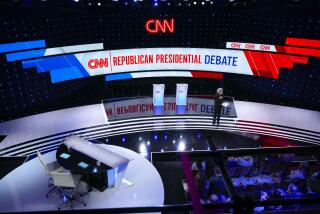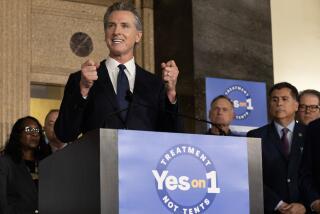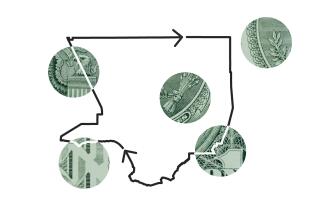Column: MapLight’s Daniel Newman wants to help Californians ‘follow the money’
We all know the Watergate prescription for uncovering political influence: “Follow the money.” It’s why organizations like MapLight were created — to track donations from source to spending to legislative outcomes. Daniel G. Newman is a co-founder and president of the Bay Area-based MapLight, itself funded chiefly by major foundations. MapLight’s database looks at big industries and big interests, their elected beneficiaries and their votes. “There’s a river of money that affects everything in politics, and candidates and donors don’t talk about it, so it’s left to MapLight and other groups to expose it,” Newman says.
What’s one example of the way MapLight works?
We look at what bills are coming up, what issues are in the news, then dig into the data and find patterns and publish those. The cellphone kill-switch bill [in Sacramento] failed at first, and we analyzed contributions from Verizon, Sprint, AT&T and T-Mobile and correlated it with how lawmakers voted. That generated attention on legislators who voted with and received money from the cellphone companies. The bill was brought back for another vote, and it passed. I think we played a role in highlighting the corrupting influence of the cellphone companies’ money.
For the midterm election, you and the League of Women voters created an online interactive feature called Voter’s Edge.
Any voter can put in a street address and get a personalized ballot showing who’s on the ballot, down to the local level. It has candidate biographies, video clips of policy speeches, campaign funding, so it’s a one-stop shop. People really appreciate having personalized information.
You also tracked the soda industry’s spending in recent California city elections where there was an attempt to tax soft drinks.
We don’t collect information on [all] local campaign spending, but we do look at some especially large-money races: the soda tax, and Chevron spending several million dollars on Richmond, [Calif.,] City Council races [this fall]. We see those as trends about big money distorting laws, even down to the local level.
You can follow disclosed money, but what about so-called dark money, the money you can’t track?
The Supreme Court Citizens United decision said transparency was important, and supported the right of government to make political money transparent, but the decision interacted with existing law to create loopholes that allow dark money groups. So now it’s possible for wealthy individuals or corporations or other groups to spend an unlimited amount to influence politics, and do it in secret.
One indication of how broken our democracy is is that dark money could be ended by having transparent contributions. The authority already exists for the Federal Election Commission to simply compel disclosure, but the institution, due in part to lack of action by President Obama, is not functional. Or Congress could pass a law, but no one has acted. No branch of government has affirmatively chosen to have secret political contributions, yet we have them.
A lot of people focus on the Citizens United decision because that’s new. But it’s a magnification of the broken system where industries and interest groups have oversized weight — a whole new level of corruption of the system, but the same basic dynamics that were there before.
It’s the independent expenditures that are ripe for abuse?
There’s two ways: Groups can give money to candidates [within legal limits], and you can do independent expenditures. Within independent expenditures, there’s the super PAC, which can raise and spend unlimited amounts but the donors are disclosed. Then you have other methods that can raise and spend unlimited amounts but donors are not disclosed. Say you’re a drug company and you don’t like a candidate’s position on healthcare. You could give $5 million to the Chamber of Commerce, which could spend it on ads attacking that candidate, and currently, it’s not possible to figure out it was a drug company that was the source of those funds.
But Citizens United encouraged transparency so voters could “give proper weight to different speakers and messages.”
The court in its twisted logic said that disclosure and transparency would take care of any problems with unlimited spending on elections, and unlimited spending couldn’t be corrupting if it was independent of the candidate. I don’t agree with either of those assertions. We don’t have transparency, and we don’t have independence. The candidate can say, “Those aren’t my ads, that’s an independent group,” when it’s really the candidate’s former chief of staff who’s running the organization. That’s how close it [can be], and it is legal.
Aren’t the FEC and the IRS supposed to be acting against at least the worst abuses?
The laws that do exist are not being enforced. You have groups that spend millions of dollars to influence elections and then shut down before they have to file any report with the government — it’s that deregulated. The IRS and FEC are so slow — purposely slow in the case of the FEC — in getting on top of what’s actually happening. There’s pressure on the IRS not to act, from the very organizations exploiting loopholes. The IRS was never designed to enforce laws about politics.
Cui bono? Who benefits?
Right now Republicans are the overwhelming beneficiaries in federal elections, so they see it as in their narrow interest to block disclosure. But there’s a lot [of dark money] for Democrats too.
As bad as dark money is, isn’t most election money still above ground?
Yes, it’s still disclosed. Whether you’re able to track every last dollar or the last 10% that’s secret is not as important as focusing on the 90% you know about, because it’s clear legislators are spending so much time and effort fundraising, to the detriment of the people who actually elected them.
We think L.A., San Francisco and other cities should pass laws that 25% of a [campaign] mailer should be taken up with the sources of funds in an understandable way — not the front groups, not “Americans for America,” innocuous names — but the actual funders, in big print. Gov. [Jerry] Brown recently signed a measure requiring the state Fair Political Practices Commission to publish the top 10 funders of ballot measures. We were big proponents of that.
Is big money unstoppable now?
There’s progress being made in the states and locally for public funding of elections so people can run for public office without special-interest money. Montgomery County in Maryland just passed it last month. I am an optimist. I work under the assumption that citizen disgust with the current system is driving the movement for change. The system is working for a few billionaires and millionaires but not for the 300 million Americans whose voices don’t matter because of the money.
Judging by poll numbers, do Americans really expect any better of politicians? Are they shocked, shocked to think that money can buy influence?
Many Americans don’t know there are better ways. Once they find out, they’re all for it. At MapLight, it’s not just, “Oh, those industries are influencing my politician in some vague way.” When you learn your lawmaker received a $2,000 check from an oil company five days before voting to implement a tax break for that oil company, it’s not complicated, it’s not mystical, it’s bribery that happens to be legal.
It’s like we all pitched in together to buy some amazing sports car, but we let the lobbyists pay for the key, and the lobbyists drive away with the car. That’s how it is with government: People fund the government and lawmakers’ salary but not the last piece, which is campaigns, and that’s the key which turns everything else.
This interview was edited and excerpted.
Twitter: @pattmlatimes
More to Read
A cure for the common opinion
Get thought-provoking perspectives with our weekly newsletter.
You may occasionally receive promotional content from the Los Angeles Times.







